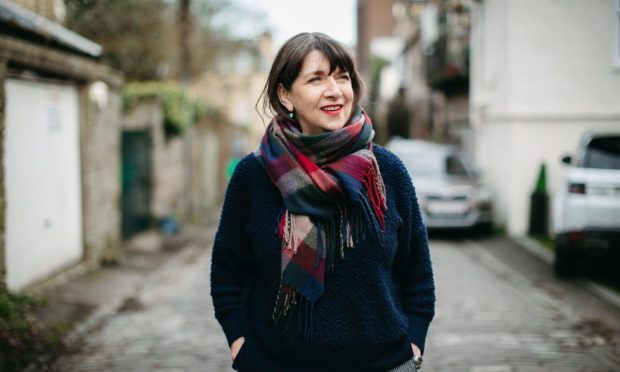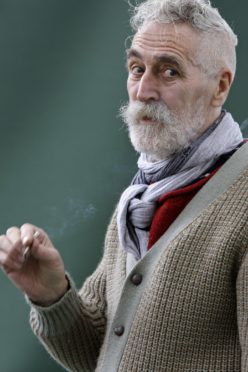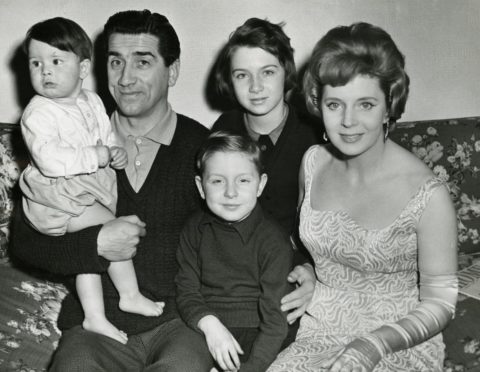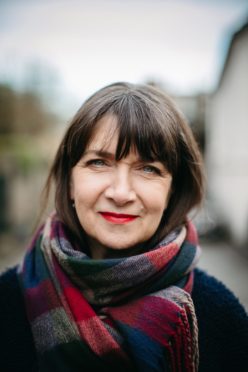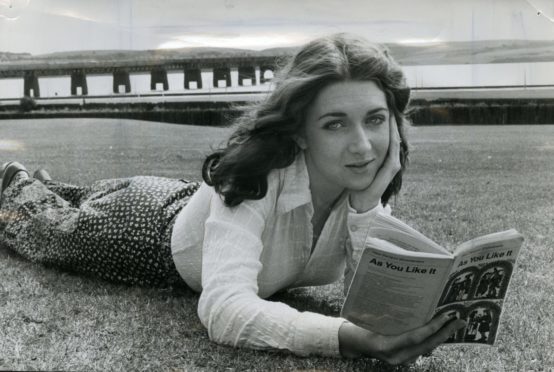Maureen Beattie would not respond kindly to the old-fashioned notion of women being seen and not heard.
She is, however, heard and not seen, in a new production by Sound Stage, which premieres through Pitlochry Festival Theatre on April 30 and runs through to May 8.
If there was ever a playwright who could hold the attention, just by his use of language in an audio-only production, it’s John Byrne, and naturally there’s much excitement that this production, Tennis Elbow, is his first in 13 years.
“It’s been an absolute joy getting my tongue and all my vocal mechanisms around John Byrne’s language,” says Maureen. “That man’s mind is just amazing.
“I came across Tennis Elbow around four or five years ago. Muriel Romanes was still artistic director of Stellar Quines and she got hold of it because she and John collaborated often. It was sent to me with the thought of doing it at the Lyceum.
“I can’t remember why it didn’t happen, but I remember reading it and I’m delighted that it’s come back to me. It’s absolutely barking in the most wonderful way.”
It’s also far from being audio only, as the producers, Sound Stage, create a theatrical experience digitally.
“It’s like a radio play, but more of a hybrid,” adds Maureen. “David Greig and Elizabeth Newman got together to explore how to make an audience feel like they’ve gone to the theatre, given that they can’t go to the theatre.”
I can’t remember why it didn’t happen but I remember reading it and I’m delighted that it’s come back to me. It’s absolutely barking in the most wonderful way.”
Once you click the link, the screen will open up into the foyer of Pitlochry Festival Theatre. You go to the box office, collect a ticket, and then a Front of House manager will ask if you would like to go to the auditorium or the bar. The soundscape will create that sense of anticipation that being in a real foyer provides.
“If friends book tickets for the same performance, they can meet in a break out room, which is the bar, and have a drink at the interval to chat. It’s a brilliant idea.”
No more Writer’s Cramp
Tennis Elbow is in some ways a continuation of Byrne’s play Writer’s Cramp, which debuted at the Edinburgh Fringe 44 years ago, but instead of focusing on Francis Seneca McDade, an aspiring writer and would-be artist from Paisley, the main protagonist here is his estranged wife Pamela, who has similarly creative aspirations – and is struggling to find her way in the world.
Maureen was involved in another virtual production recently, filmed at Ayr Gaiety, a theatre so closely linked with her late father, the variety and acting legend Johnny Beattie, who died last July, aged 93.
“I’m at my dad’s flat in the West End of Glasgow at the moment,” she says. “This is the first time I’ve been able to get here to sort out his estate and also try to put this vast collection of theatrical memorabilia into some kind of order.”
The collection will be handed to the theatrical collection of the University of Glasgow, who will catalogue and preserve it, but there have been a few surprises in there.
“My mum and dad were best friends with the comedy writer Stan Mars and his wife. Going through this collection I’ve found out that Stan write the first Parliamo Glasgow that eventually Stanley Baxter made famous, but it was actually written for Rikki Fulton.
Also, he wrote the first Francie and Josie sketches. This is important stuff in the history of Scottish comedy.”
Both Maureen and I lost a parent during the past year, but not due to Covid, and discuss the sadness of the restrictions.
“It was so difficult, wasn’t it? You know my Dad was such a figure in Scottish entertainment we know the chapel would have been packed to the rafters and more. The outpouring of affection for Dad was very comforting to all my family. It was quite intimate and I do wonder whether when we get out of this we will have back-to-back memorials or we find a new way of honouring people who have made a significant contribution – in any field.”
You know my Dad was such a figure in Scottish entertainment… the outpouring of affection was very comforting to all my family.”
As President of Equity, the actors’ union, she has also had the sadness of watching her members struggle financially, with little assistance.
“It’s been absolutely horrific. The most vulnerable members remain the most vulnerable and those who struggle to find work are finding it even harder.
“The economic impact in our industry has been enormous. There are some at the very top who are driven around by chauffeurs and have multiple homes, but the truth is most people in entertainment don’t have two pennies to rub together. And we bring in £111bn into the economy every year – more than many other industries who have been given significant help.”
Of course Maureen has been a working actor since the 1970s.
She had a period working in the educational touring company at Dundee Rep but after a short time working at her mother’s theatrical agency, wondering whether acting was for her, she was coaxed back to Dundee by the Rep’s artistic director Stephen McDonald, who cast her as Rosalind in As You Like It at Dundee Rep.
There are some at the very top of our industry who are driven around by chauffeurs and have multiple homes, but the truth is most people in entertainment don’t have two pennies to rub together.”
“It was at that point I knew acting was the only thing I ever wanted to do. I had such a happy time there and it played so many leading parts there too.”
Like most of us she’s considering returning to normality and seeing the bottom half of everyone’s faces. One thing she hasn’t stopped, however, is her everyday lippy.
“I have invested in the wonder that is Lipcote,” she says. “In fact, I should have taken out shares in Lipcote. It keeps your lipstick in place but even then, sometimes you take your mask off and people are looking at you strangely. Then you realise you look like the Joker on a bad day!”
Tennis Elbow will be on Sound Stage from the April –8 May. Book tickets here.
